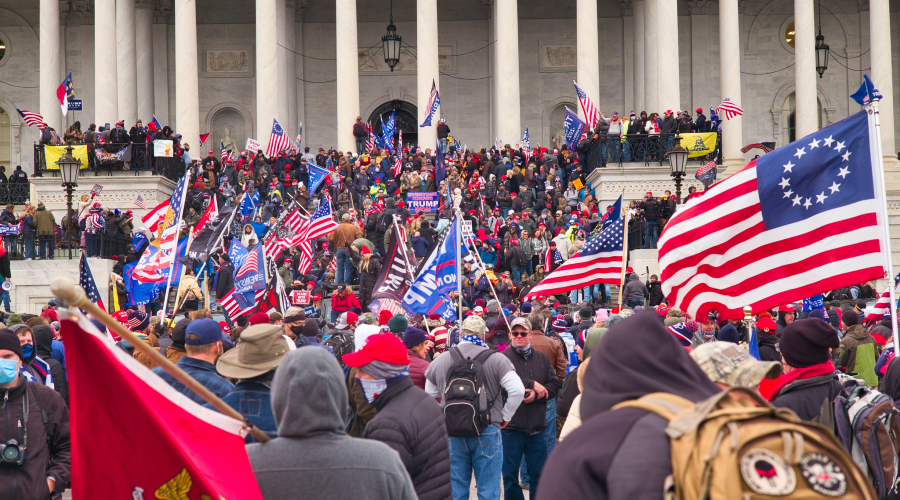Oath Keepers Leaders Were Found Guilty, but the Threat of Antigovernment Extremism Remains
Stewart Rhodes' conviction will further undermine the organization he led, but sympathizers have other options.

Published by The Lawfare Institute
in Cooperation With

Editor’s Note: With Oath Keepers leader Stewart Rhodes convicted of seditious conspiracy, the group he founded is at a crossroads. The University at Albany’s Sam Jackson, author of a recent book on the group, explains how the conviction is creating disarray in the group’s ranks but notes that other so-called Patriot movements might benefit and that the overall cause will remain strong.
Daniel Byman
***
The verdict is in. After weeks of evidence and three days of deliberation, a jury has found Stewart Rhodes guilty of seditious conspiracy in the first of several trials for members and affiliates of Oath Keepers involved in the Jan. 6 attack on Congress. Prosecutors didn’t get a clean sweep of all the charges for the five defendants in this case, but every defendant was found guilty of at least one felony charge.
From the Oath Keepers’ founding, it has walked along the edge of violence. Since its first public event on April 19, 2009, the group has consistently asserted that the U.S. government has gone rogue, become increasingly tyrannical, violated the rights of Americans, and even been complicit with international actors seeking to destroy the country. As I’ve written in my book, the group’s leaders regularly urged those they considered to be patriotic Americans to prepare to fight back against the government—and to get their friends and neighbors involved in those preparations, even if that required a bit of misdirection, for example, by drawing parallels between the organization’s Community Preparedness Teams program and FEMA’s Community Emergency Response Teams program. At the same time, the group has engaged in “strategic ambiguity,” keeping much of the discussion of tyranny, violation of rights, and proper responses to tyrannical government abstract (and thus legal) and letting individuals fill in the blanks, deciding for themselves when their rights are being violated and whether violence is a justified response.
The group has also used historical analogies to think about violence. Oath Keepers frequently point to moments of conflict and crisis in U.S. history that (supposedly) illustrate government gone bad and the successful resistance to that government mounted by patriotic citizens. Primarily, this means talking about the American Revolution, the founders, and the “long train of abuses” that those founders argued justified a violent response to the British government. Oath Keepers leaders have said, time and again, that contemporary America faces the same kind of situation experienced by the residents of the British colonies of North America in the late 18th century, and that contemporary Americans can follow the model provided by those who fought against the British and won America’s independence in order to defeat America’s domestic enemies now.
The Oath Keepers organization has experienced infighting and fractures in recent years, even since before Jan. 6. Some state groups with “Oath Keepers” in their name have stated that they have no affiliation with the national organization, though this merits skepticism given the surge of bad publicity for the organization. Some of these groups claim they are unaffiliated, while others say that they were formerly affiliated. Without direct evidence, it seems unlikely that truly independent organizations with no ties to this prominent national group would use the “Oath Keepers” name. But even before the insurrection, there were periodic public statements from former Oath Keepers that Rhodes was a poor leader whom they couldn’t work with anymore.
As right-wing extremism has received more public attention in the past few years, much of the focus has been on discrete groups like Oath Keepers and Proud Boys. But all of these extremist groups are embedded in larger movements and networks. Many individuals in this ideological space support groups without becoming formal members. For example, the Oath Keepers claim around 40,000 dues-paying members (and watchdog estimates suggest that the real number is perhaps 10 percent of that), but before the group’s primary Facebook page was removed in August 2020 for violating community guidelines, the page had more than 500,000 followers. The group has also tapped into other movements to build support: For example, Rhodes spent time in 2009 speaking at Tea Party events, even leading a crowd in Knoxville, Tennessee, in an oath-swearing ceremony. As the organization faces challenges and bad publicity related to the Jan. 6 convictions and other ongoing cases, these unaffiliated supporters might rethink their support—or at least their public support—for the group.
These broader movements and ideological networks provide different options for individuals who are looking to join up with others who share their beliefs about the threats faced by themselves and the nation. For example, consider the Three Percenters, another sub-movement within the broader antigovernment militia movement. There is little ideological difference between Oath Keepers and “Threepers”: The decision to join an Oath Keepers chapter rather than a Threeper group might come down to which one has more members that a person knows or which one has more convenient meetings. Now, to the extent that the guilty verdicts make the Oath Keepers brand toxic to other antigovernment extremists, members and supporters might choose to reorient around a Threeper group or another entity in this movement.
All of this complexity makes it difficult to forecast what effects these initial guilty verdicts will have on the Oath Keepers, its members, and its supporters. Some will likely denounce the verdict as political persecution, perhaps even arguing that it is further evidence of the tyranny that the group has been talking about since its founding. More pragmatically, though, it is unclear who will now lead the group’s day-to-day operations, assuming that it doesn’t collapse and that Rhodes will face substantial prison time. After Rhodes was arrested, Kellye SoRelle, the general counsel for the organization, announced that she would be the group’s interim president, but when Rhodes was denied bail, she stated that she wouldn’t continue in that interim role but didn’t indicate who would take her place. SoRelle was later arrested on charges related to the insurrection and its aftermath.
Others in the movement might see this as Rhodes and other defendants getting what has been coming to them. As seen with the Oath Keepers chapters that denounced the insurrection, some in this ideological space think that the events at the U.S. Capitol were foolish and disastrous, even if they do not necessarily disagree with the ideas that motivated that attack on democracy. For example, the leader of the former North Carolina chapter of the group described the insurrection as “an ugly stain on our nation’s history” but defended the “innocent people that were there to hear the speeches.” The Oath Keepers’ central leadership also took this position previously: During the 2016 occupation of the Malheur National Wildlife Refuge, which was organized by other antigovernment extremists, the group repeatedly said that it disagreed with those actions, primarily for tactical reasons, but did not contest the underlying idea that motivated the occupation—that the federal government was acting illegitimately. Those who have this reaction to the guilty verdict might continue their activity and retain their ideological proclivities with little change.
For individuals who might be amenable to antigovernment extremism but aren’t current supporters of this form of extremism, this conviction could have larger ramifications. Aside from the prison time Rhodes and the other defendants now face, being found guilty of seditious conspiracy could make it harder for the group to persuade a broad American public audience with a compelling message of patriotism and pro-constitutionalism: Now, that message will have to compete with the message that the group engaged in sedition. It’s difficult to know how significant this will be, though, given the numerous other actors in this space who don’t have the stigma of sedition attached to them.
It will take time to understand the full consequences of these convictions. Though the Department of Justice was able to obtain convictions against these individuals who so brazenly attacked American democracy, it is far too early to declare victory against those who directly participated in the insurrection, much less the broader set of Americans who invoke patriotism and wrap themselves in the flag to justify violence against the government. The effort against false patriotism did not start with this prosecution, nor will it end with it.




